

Russian Youth Policy in the Temporarily Occupied Territories: City of Sevastopol
After the occupation of the Autonomous Republic of Crimea and the city of Sevastopol and the beginning of military operations in Donetsk and Luhansk regions in 2014, Russia focused its attention on fostering patriotism among the youth both within the country and in the territories it occupied. In particular, the Russian Strategy of National Policy emphasizes that the so-called incorporation into the Russian Federation of “new subjects – the Republic of Crimea and the federal city of Sevastopol” caused a significant patriotic surge in the country. To “maintain” this, substantial financial resources were allocated, especially for working with youth.
From 2014 to 2018, the budget for youth policy in the Russian Federation (hereinafter referred to as RF) ranged from 1.13 billion rubles to 18.47 billion rubles. By 2021, a significant increase was observed, with expenditures exceeding 34.3 billion rubles. For this budget item in 2024, more than 56.1 billion rubles are allocated in the RF budget, and in 2025, the Russian authorities plan to allocate 66 billion rubles. It is worth noting that additional funds are included in the RF budget under the category “Patriotic Education,” which are also effectively used to engage young people in propaganda events.
The full-scale Russian invasion in 2022 led to the illegal annexation of certain parts of Ukraine’s territory (Donetsk, Luhansk, Zaporizhzhia, and Kherson regions) into the RF on September 30, 2022. In the so-called “new territories,” Russian legislation began to apply, including in the sphere of youth policy. Thus, along with the temporarily occupied Crimea and Sevastopol, a significant part of Ukrainian youth came under Russian control.
The definition of the term “youth policy” in the legislation of the Russian Federation
Youth policy is a set of measures of a regulatory-legal, financial-economic, organizational-managerial, informational-analytical, personnel, scientific, and other nature. These measures are implemented based on interdepartmental cooperation among federal government authorities, authorities of the constituent entities of the Russian Federation, local self-government bodies, with the participation of civil society institutions, legal entities regardless of their organizational-legal forms, and citizens of the Russian Federation, including individual entrepreneurs. They are aimed at creating conditions for the development of youth, their self-realization in various spheres of life, and the civic-patriotic and spiritual-moral education of young citizens to achieve sustainable socio-economic development, global competitiveness, and national security of the Russian Federation (author’s translation).
| Extract from the original: “Федеральный закон от 30.12.2020 N 489-ФЗ (ред. от 22.04.2024) “О молодежной политике в Российской Федерации”Статья 2. Основные понятия, используемые в настоящем Федеральном законеДля целей настоящего Федерального закона используются следующие основные понятия: […] 4) молодежная политика – комплекс мер нормативно-правового, финансово-экономического, организационно-управленческого, информационно-аналитического, кадрового, научного и иного характера, реализуемых на основе межведомственного взаимодействия федеральных органов государственной власти, органов государственной власти субъектов Российской Федерации, органов местного самоуправления при участии институтов гражданского общества, юридических лиц независимо от их организационно-правовых форм и граждан Российской Федерации, в том числе индивидуальных предпринимателей, и направленных на создание условий для развития молодежи, ее самореализации в различных сферах жизнедеятельности, на гражданско-патриотическое и духовно-нравственное воспитание молодых граждан в целях достижения устойчивого социально-экономического развития, глобальной конкурентоспособности, национальной безопасности Российской Федерации; […] |
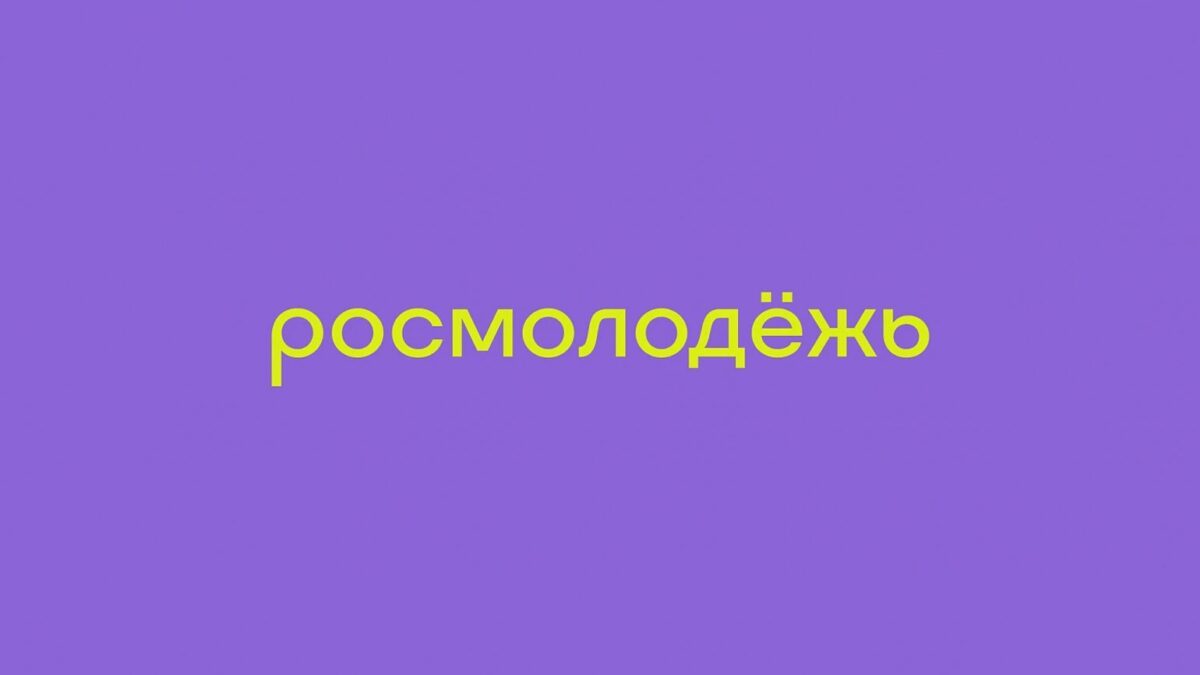

The Federal Agency for Youth Affairs (hereinafter referred to as Rosmolodyozh) is a federal executive body of the Russian Federation responsible for implementing state policy in the field of youth policy and for interacting with public organizations and youth movements regarding measures aimed at ensuring moral and patriotic education. At the regional level, including in temporarily occupied territories (TOT), these responsibilities are carried out by the relevant executive authority: a ministry, committee, or department for youth policy (for example, in the TOT of the Donetsk region, this is the “Ministry of Youth Policy of the DPR,” and in occupied Crimea, the “State Committee for Youth Policy of the Republic of Crimea”).
Russia uses youth policy to ensure loyalty to the occupying authorities and to form a mobilization reserve. Therefore, the Center for Civic Education “Almenda” conducted a study to draw public and international attention to the violations committed by the Russian Federation in the youth sector in the temporarily occupied territories of Ukraine.
This article discusses the formation of Russian youth policy in occupied Sevastopol, the individuals responsible for its implementation, and the measures being carried out to militarize and erase the Ukrainian identity of young people, among other issues. Previously, information was shared about the “Youth” Committee of Crimea: “Patriotic” Actions on Russian Flag Day and Propaganda for Participation in the So-Called Special Military Operation (SMO).
Legal regulation and financing of youth policy in occupied Sevastopol
As noted above, in 2014, the Russian Federation occupied the Autonomous Republic of Crimea and the city of Sevastopol, initiating an unlawful process of integrating these Ukrainian territories into the Russian legal and social framework. This included the sphere of youth policy. In 2015, the occupation authorities adopted the “Law of the City of Sevastopol” “On the Implementation of State Youth Policy in the City of Sevastopol.” This “legislative act” remained in force until 2021, when it was replaced by a new “law” dated June 26, 2021, No. 655-ZS “On Youth Policy of the City of Sevastopol,” which remains effective to this day.According to Article 4 of this “law,” one of the tasks of youth policy is the “civic formation, physical development, and patriotic education of young citizens.” The law emphasizes the importance of fostering in Sevastopol’s youth a sense of pride in Russia’s history, responsibility for its future, and respect for the traditions and culture of the peoples of the Russian Federation (Article 9).
Additionally, the “law” outlines measures for the “preparation of young citizens of conscription age in military registration specialties for subsequent military service in the Armed Forces of the Russian Federation” (Article 6, author’s translation).
Such policies violate the rights of youth in occupied Sevastopol and serve as a tool for eradicating Ukrainian identity and promoting militarization. The preparation of young people from the temporarily occupied territories (TOT) for service in the Russian army and the encouragement to join the armed forces of the Russian Federation constitute a violation of Article 51 of the Geneva Convention Relative to the Protection of Civilian Persons in Time of War. This article prohibits the conscription of civilians into the armed forces of the occupying power, as well as propaganda of voluntary enlistment.
In addition to the aforementioned act, the “legal foundation” of youth policy in the TOT of Sevastopol includes: the Constitution of the Russian Federation, the Federal Law “On Youth Policy in the Russian Federation,” the charter of occupied Sevastopol, other regulatory and local acts adopted to implement youth policy, as well as municipal acts. According to Rosstat data, as of the beginning of 2023, 151,066 individuals aged 14 to 35 resided in the TOT of Sevastopol, accounting for 27% of the city’s total population. In 2023, funding allocated for the implementation of youth policy amounted to 28.978 million rubles, and more than 700 youth events were held, reaching over 82,000 young people.
Persons responsible for the implementation of youth policy in occupied Sevastopol
Almost immediately after the annexation of Sevastopol, by decree of the so-called governor of Sevastopol on June 20, 2014, the “Department for Youth and Sports Affairs of Sevastopol” was established, which was responsible, among other things, for youth policy in the city. On October 30, 2023, during a regular session of the “government of Sevastopol,” a decision was made to dissolve the department and replace it with two separate agencies:
- The “Sports Department,” headed by Serhiy Reznichenko, who had previously headed the dissolved institution.
- The “Youth Affairs Department,” under the leadership of Marina Slonchenko.
Reference
“YOUTH AFFAIRS DEPARTMENT OF THE CITY OF SEVASTOPOL”
- Affiliation: An occupation executive authority in the city of Sevastopol.
- Registration Date: November 17, 2023.
- Head: Marina Yuryevna Slonchenko, serving as the head from the moment of the department’s registration to the present.
- Location: 299011, Sevastopol, Lenin Street, Building 2.
- Scope of Activities: Executes the “state functions” of the occupation authorities in Sevastopol concerning youth policy and participates in activities such as:
- Patriotic education of youth;
- Training participants of Sevastopol’s “Dvizhenie Pervykh” (Movement of the First), their career guidance, and organizing leisure activities, among others.
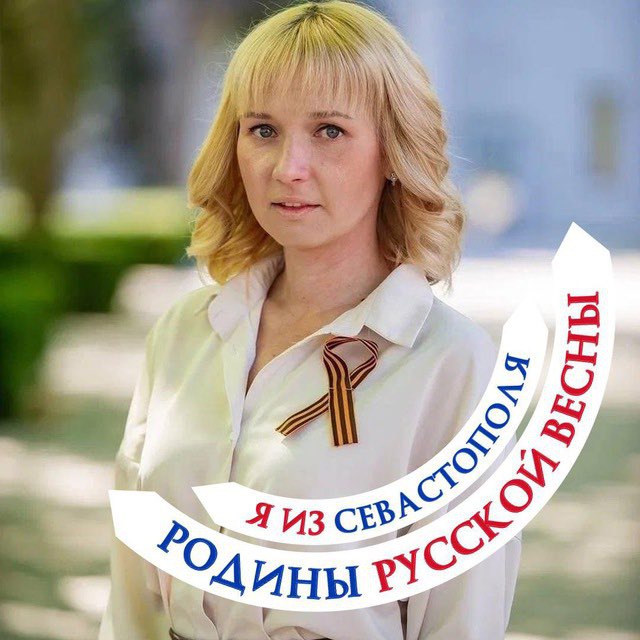

Marina Slonchenko was born on March 31, 1991, in Sevastopol, Ukraine. Prior to her appointment as the head of the “Youth Affairs Department of the City of Sevastopol,” she held the position of deputy head of the dissolved “Department for Youth and Sports Affairs of Sevastopol.” Thus, her professional activity has been closely connected with the youth sector for a long time.
As the head of the occupation authority in Sevastopol, she independently manages the department, acts on its behalf without a power of attorney, and is responsible for its activities.


She is also a lecturer for the Russian Society “Znanie,” which was established in 2015 by a decree of Russian President Vladimir Putin and serves as an analogue of the Soviet-era organization of the same name (more details can be found here). As a lecturer for the society, in December 2023, she delivered a lecture on the topics “Russia’s Achievements in the 21st Century” and “Achievements of the Hero City Sevastopol.” Additionally, as part of the “StateStart.Dialog” (“GosStart.Dialog”) program by Rosmolodyozh, she encourages students to seek employment in “state institutions” (i.e., occupational authorities), promoting the opportunities for youth development in public service within the region.
Slonchenko positively evaluates and actively supports the involvement of young people from Sevastopol in supporting the “Special Military Operation” (SMO): they sew eco-bags, weave camouflage nets, assemble first aid kits for the frontlines, and organize informal meetings with “SMO” veterans.
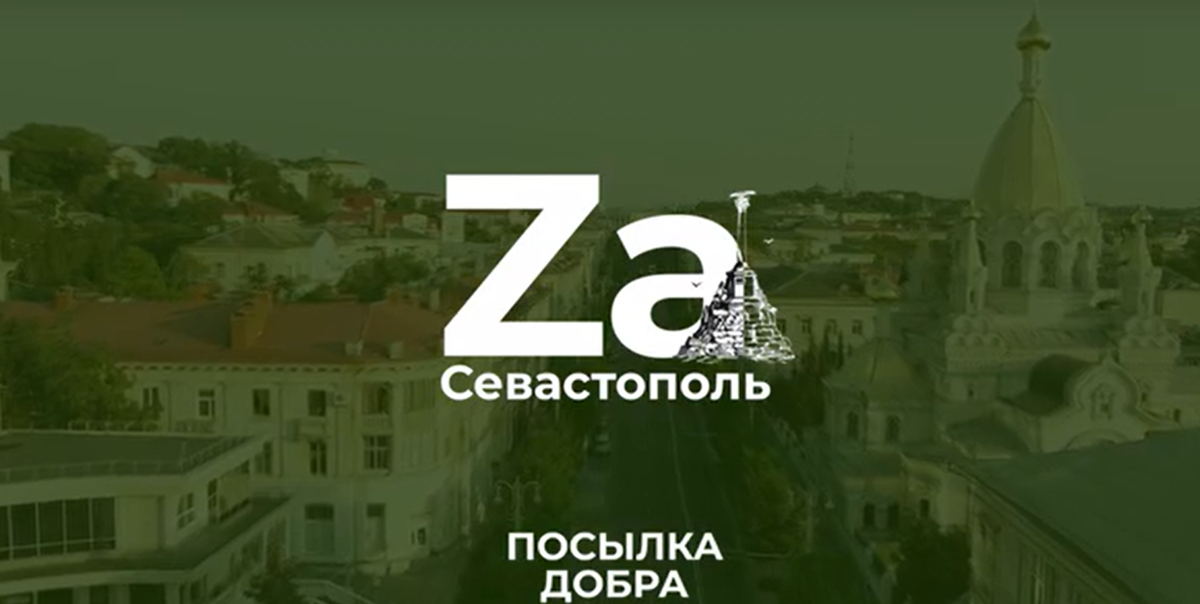

In November 2024, Marina Slonchenko announced two projects being implemented by the “Youth Affairs Department of the City of Sevastopol” with the support of Rosmolodyozh. One of these projects involves the production of 20 short documentary segments about the families of “SMO heroes,” volunteers supporting participants in the war against Ukraine, and residents of “historical territories.” Additionally, 30 video postcards (“Parcel of Goodness”) with messages prepared by young people are to be sent to the frontlines for Russian military personnel.
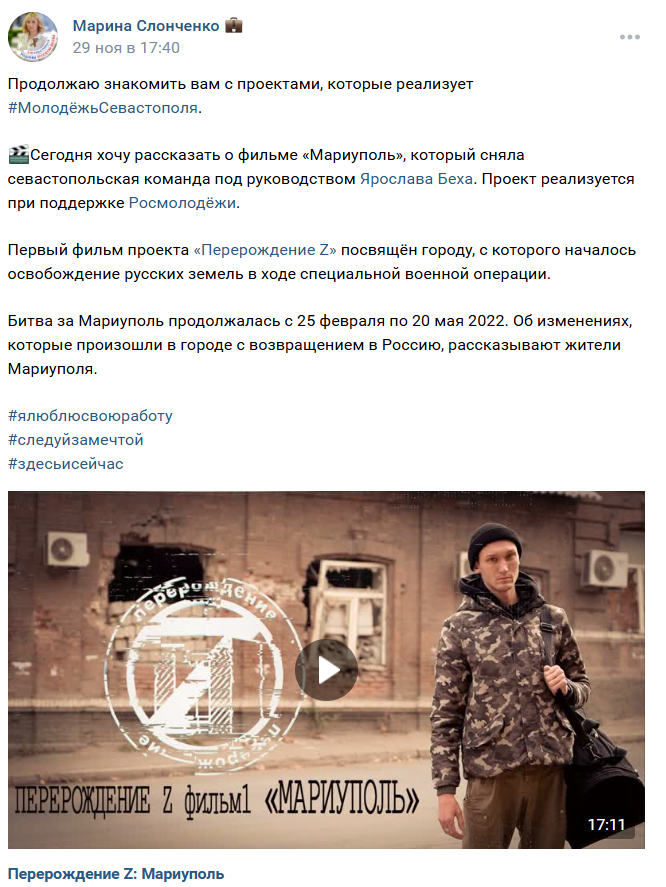

The other project involves the film “Mariupol”, created by a Sevastopol-based team. According to the head of the “Youth Affairs” department, the film is “dedicated to the city from which the liberation of Russian lands began during the special military operation. The Battle of Mariupol lasted from February 25 to May 20, 2022. The film features Mariupol residents talking about the changes that have occurred in the city since its return to Russia” (author’s translation).
In the occupied territory of Sevastopol, the youth movement “Dvizhenie Pervykh” (Movement of the First) is actively operating, including with the support of the “Youth Affairs Department of the City of Sevastopol.” They organize numerous patriotic events, among which is the distribution of Russian passports to minors as part of the campaign “We Are Citizens of Russia!”
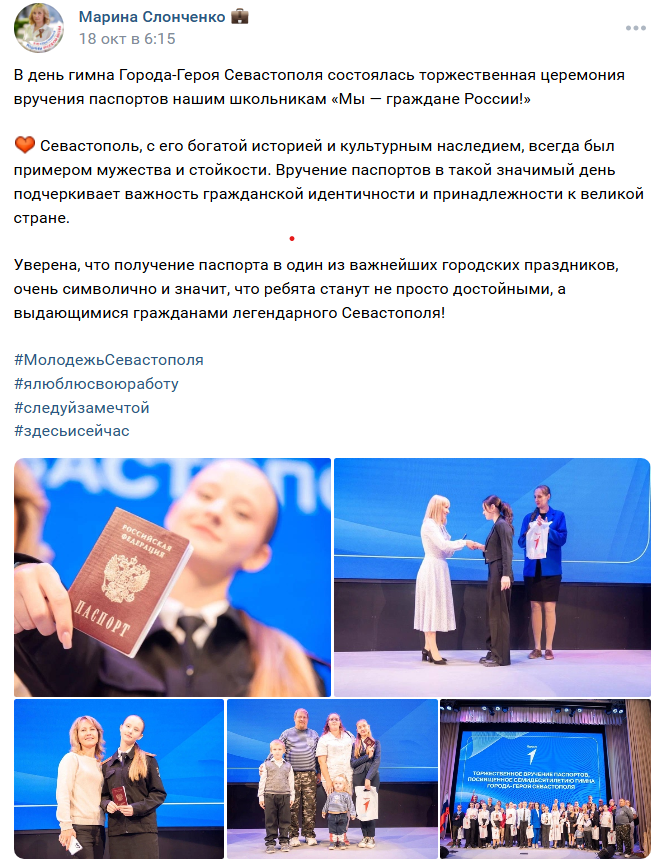

Next is the text translated into English from a post published by Marina Slonchenko on her page on the social network “VKontakte”:
“On the Day of the Anthem of the Hero City of Sevastopol, a solemn ceremony was held to present passports to our schoolchildren as part of the ‘We Are Citizens of Russia!’ campaign.
Sevastopol, with its rich history and cultural heritage, has always been an example of courage and resilience. Presenting passports on such a significant day emphasizes the importance of civic identity and belonging to a great country. […]”
The head of Sevastopol’s “Youth Affairs” department also visited territories of Ukraine occupied by Russia, including the Zaporizhzhia region, where she participated in a joint event with the “Minister of Youth Policy of the LNR,” Yulia Velichko.
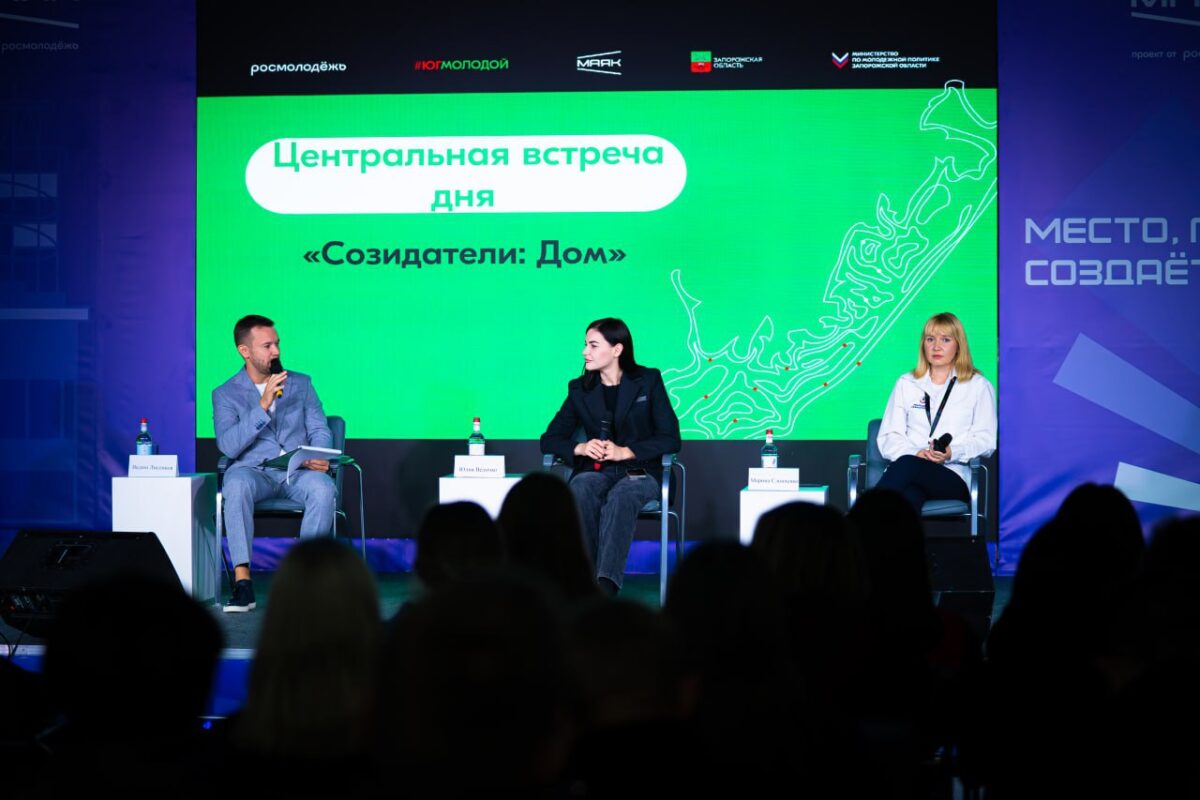

In summary, Russian youth policy in the temporarily occupied territories, particularly in Sevastopol, is aimed at erasing Ukrainian identity, promoting militarization, and imposing Russian patriotism. This policy has specific organizers and executors, including Marina Slonchenko. The “Youth Affairs Department of Sevastopol,” headed by her, plays a key role in this process by actively encouraging young people to join Russian civil service and involving them in various initiatives supporting the “Special Military Operation” (SMO). Additionally, significant emphasis is placed on fostering loyalty to Russian authorities and cultivating an ideology that supports militarism.
The article was prepared by the Center for Civic Education “Almenda” within the framework of the project “Russian Youth Policy as an Instrument of Indoctrination and Militarization of Children”. The content of this document is the sole responsibility of the Public Organization “Center for Civic Education “Almenda” and does not necessarily reflect the position of Civil Rights Defenders.



